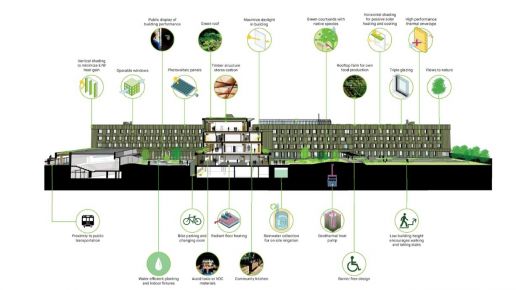Trinity College is pleased to announce the inaugural leadership of its Integrated Sustainability Initiative. Stephen Scharper will serve as Director of Sustainability and Nicole Spiegelaar will serve as the Assistant Director. In these roles, they will develop and support the ambitious Initiative that is designed to integrate the principles of sustainability into the daily life at the College – from academic programs and co-curricular programming to the student experience.
In October 2019, thanks to a very generous $10 million gift by Trinity alumnus Brian Lawson and U of T alumna Joannah Lawson, the College launched the Integrated Sustainability Initiative. In addition to integrating sustainability into all facets of the College, the Initiative will transform the built environment through the College’s new building, the Lawson Centre for Sustainability, scheduled to open in 2024. The Lawsons’ vision and support for sustainability will enable Trinity College to build upon its longstanding commitment to environmental leadership by creating a new model in which students both ‘live and learn’ sustainability.
“The Integrated Sustainability Initiative will have a profound impact on the student experience at Trinity College and will equip students with the tools to address one of the globe’s most pressing challenges,” said Professor Mayo Moran, Provost and Vice-Chancellor of Trinity College. “We are thrilled to have Stephen Scharper and Nicole Spiegelaar take on these important new roles at Trinity. Their multi-disciplinary approach and focus on the student experience will enable us to weave sustainability principles into all facets of life at the College, creating a dynamic ‘living lab’ at Trinity.”
Professors Scharper and Spiegelaar will bring their considerable expertise to assist with the integration of sustainability principles into the College’s academic programs including International Relations, Ethics, Society & Law, Immunology, Margaret MacMillan Trinity One, and the Faculty of Divinity. They will also be responsible for developing a wide array of sustainability-oriented opportunities for students involving experiential learning, research, internships and community outreach among other activities.
“The Integrated Sustainability Initiative is a remarkable opportunity to explore and broaden the values and practices of sustainability within the lifeway of Trinity College. Through a weaving together of ecological, political, economic, social and spiritual concerns, the Initiative will assist all members of the Trinity community to explore pathways of awareness and critical, hopeful engagement with some of our most pressing global concerns,” Professor Stephen Scharper said. Prof. Scharper is an Associate Professor at the School of the Environment and at the Department of Anthropology at the University of Toronto Mississauga, and his new role is a joint appointment with the School of the Environment. His teaching and research interests and public scholarship are centred on sustainability, social justice and the environment (see bio below).
“Through direct engagement with sustainability on campus and in the larger community, our students become practically equipped and personally shaped in a way that brings awareness to our environmental and human connections. This is a critical step in addressing our crises of environment, mental health and social justice, and I feel deeply honoured to walk this path with a collective Initiative of shared vision and values,” said Professor Nicole Spiegelaar, who is an Assistant Professor in a joint appointment with the School of the Environment. Prof. Spiegelaar’s expertise focuses on sustainability, environmental health and psychology, food systems and Indigenous relations (see bio below).
The Integrated Sustainability Initiative includes a number of innovative features such as a farm-to-table program, which will serve as a vehicle for integrating sustainability across both academic and student life experience through urban agriculture, a community kitchen for teaching and learning, and food-related research. The Initiative will provide students with the opportunity to work with experts at the College as well as with university and community partners on sustainability projects, and to engage in outreach and knowledge translation activities including symposia and conferences.
The Faculty of Arts & Science and the School of the Environment are partnering with Trinity College to support the Initiative. “We are grateful to the School of the Environment and to the Faculty of Arts & Science for their important support for this innovative Initiative. One of the central aims of the Initiative is to create a model for the wider University of Toronto community to demonstrate how it is possible to integrate sustainability education and practices into the heart of both academic programming and the student experience,” Provost Moran said.
“The Faculty of Arts & Science is committed to incorporating sustainability in all that we do, and I applaud Trinity College’s novel Integrated Sustainability Initiative. This is a great model for all of us. Now more than ever, the U of T community needs to continue to work together to leverage our strengths and partnerships to reduce our environmental impact,” said Professor Melanie Woodin, Dean of the Faculty of Arts & Science.
“Sustainability affects everything, so integrating sustainability education into the life of the college will make this initiative particularly relevant for our students. The School is delighted to partner with Trinity in developing the program, and we’re particularly pleased to have recruited a stellar leadership team in Professors Scharper and Spiegelaar,” said Professor Steve Easterbrook, Director of the School of the Environment.
“Trinity has a long history of leadership in sustainability and through the Integrated Sustainability Initiative, we’re excited to demonstrate what is possible and to make a positive difference on the local and global stage,” Provost Moran added.
Trinity College strives to be the greenest college on the University of Toronto campus and is committed to sustainable practices and responsible stewardship. For the 2020-2021 academic year, upper-year students in Trinity’s academic programs will now study sustainability through newly designed interdisciplinary courses in the International Relations Program and the Ethics Society & Law Program. The Initiative complements and builds on our other sustainability activities including the Butterfield Environment & Sustainability stream of the Margaret MacMillan Trinity One Program, which welcomed its third cohort of students in September 2020. For a list of recent initiatives and ongoing green projects, visit Trinity’s Sustainability webpage.
Stephen Bede Scharper
Dr. Stephen Bede Scharper is a professor, author, editor, journalist and public scholar with a special focus on social justice and the environment. He is also Associate Professor at the School of the Environment at the University of Toronto and the Department of Anthropology at University of Toronto at Mississauga. Dr. Scharper’s research and teaching are in the areas of environmental ethics, worldviews and ecology, religion and ecology, liberation theology, sustainability ethics, as well as nature and the city. His recent books include For Earth’s Sake: Toward a Compassionate Ecology (Novalis), The Natural City: Re-envisioning Human Settlements (co-editor, University of Toronto Press), and Redeeming the Time: A Political Theology of the Environment (Continuum). The Green Bible: Words of Hope for a Suffering World, co-written with Simon Appolloni (Paulist Press/Novalis), is coming out in fall 2020.
Dr. Scharper strives to embody the values of public scholarship and a deep commitment to public engagement with environmental and social justice issues. A prolific writer and scholar, he has contributed over 500 reviews and articles to various academic and popular journals, and served as president of the Religious Education Association of the US and Canada, and editor with Orbis Books and Novalis Publishing. Dr. Scharper has taught at McGill University, Prescott College, the University of Waterloo, the University of Vermont, and the University of Notre Dame, where he held the John A. O’Brien Chair in Ethics as a Visiting Professor. His biography appears in Who’s Who in Religion? and Who’s Who in Canada?
Nicole Spiegelaar
Nicole Spiegelaar is an Assistant Professor with Trinity College and the School of the Environment in the teaching stream. She works with complex adaptive systems theory and interdisciplinary knowledge integration to address sustainability challenges. Her current research looks at the natural environment as a setting and systems-model for mental wellness and is informed by Indigenous Knowledge of the James Bay Cree, Environmental Psychology and Ecosystems Science. This is formative in Nicole’s approach to sustainability programming, where interdisciplinary experiential learning and complexity not only provide students with critical skills to address global sustainability issues, they promote sustainable behaviour and foster student psycho-social resiliency in uncertain times. Nicole sees great potential for intentional design of academic spaces and pedagogy that encourages integrated thinking, collaborative relationships, and healthy student experiences.
Major design features of the Lawson Centre for Sustainability included in the design are depicted in the above Figure include:
- Hybrid mass timber/concrete structural design
- Geothermal-source heating and cooling with distributed chilled beams/radiant heating and cooling
- Enhanced building envelope design to achieve highly efficient thermal and airtightness operating targets
- Almost no use of natural gas in the building
- High-efficiency and highly effective ventilation system for maximum IAQ
- Rainwater collection and reuse system with below-grade cistern (this will be used for toilet flushing also as below)
- Rooftop photovoltaic array for energy generation
- Rooftop agriculture program, including an outdoor farmed area
- Addition of planted green roofs where possible, in combination with setbacks and other building design features
- Advanced measurement and verification
- Ample bicycle parking, including an indoor facility with showers and lockers
- Landscaping to feature drought-tolerant and native species
Additional features will include:
- Energy efficient lighting and controls, coordinated with natural light where appropriate
- Energy efficient equipment and fixtures
- Flexible building automation systems (with occupancy/occupant load sensors to moderate HVAC and lighting levels)
- Zoned HVAC control wherever beneficial and desirable
- Durable, local materials with renewable and/or recycled content
- Provision of recycling depots for source-separation of waste throughout the building to meet the needs of the University’s recycling and waste reduction programs and vehicular access to these sites
- Low-use systems for flushing toilets and urinals, including use of collected grey water for toilet flushing in common public-facing areas
- Water-efficient fixtures and combined water fountains/bottle-filling stations

